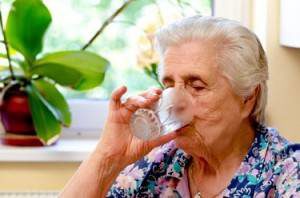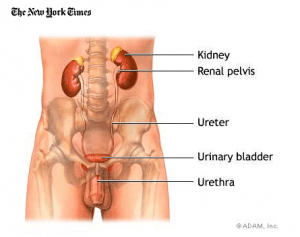Drink plenty of water to avoid UTIs
Drink plenty of water to avoid UTIs.
 Between the hot summer air we’re now experiencing in New England and the cold winter air just past, people of all ages must remember to stay hydrated daily. But for seniors, it is especially important. Many seniors try to limit the amount of fluids they drink to cut down on trips to the bathroom. But t his strategy often leads straight to a urinary tract infection (“UTI”), also known as a bladder infection.
Between the hot summer air we’re now experiencing in New England and the cold winter air just past, people of all ages must remember to stay hydrated daily. But for seniors, it is especially important. Many seniors try to limit the amount of fluids they drink to cut down on trips to the bathroom. But t his strategy often leads straight to a urinary tract infection (“UTI”), also known as a bladder infection.
Approximately 40% of women and 12% of men will experience at least one urinary tract infection during their lifetime. Women who have gone through menopause lose the protective effects of estrogen, putting them at greater risk for UTIs.
Because we have seen this issue so often with our clients, we would like to offer some background information and advice on preventing UTIs.
What is the urinary tract?
The urinary tract is the body’s drainage system. Every minute, a person’s kidneys filter about 3 ounces of blood, removing wastes and extra water. The wastes and extra water comprise the 1 to 2 quarts of urine a person produces daily. The urine is then stored in the bladder, which expands like a balloon as it fills. When the bladder empties, a muscle called the sphincter relaxes, and urine flows out of the body through the urethra.
What is a urinary tract infection (UTI)?
A UTI is an infection in the urinary tract. Normal urine is sterile and contains no bacteria. However, many bacteria live in the rectal area and on your skin. Bacteria may get into the urine from the urethra and travel into the bladder. Normally, bacteria that enter the urinary tract are rapidly flushed out by the body before they cause symptoms. But if urine stays in the bladder too long without flushed through, harmful bacteria can grow and overwhelm the body’s immune system.
How Do I Recognize the Symptoms of UTI?
Elderly people with a serious urinary tract infection don’t always exhibit the hallmark sign of fever because their immune systems may be unable to mount a response to infection due to the effects of aging. Elders often don’t exhibit any of the common symptoms – or don’t express them to their caregivers.
UTIs in the elderly are often mistaken as the early stages of dementia or Alzheimer’s, according to NIH, because symptoms include:
• Confusion
• Agitation
• Hallucinations
• Loss of appetite
• Poor motor skills or dizziness
• Falling
• Incontinence
A sudden behavior change is, in fact, one of the best indicators of a urinary tract infection in older adults. Anytime there is a change… if one day they can dress or feed themselves and then there’s a sudden change, a red flag should go up in a caregiver’s mind. Falls, confusion, incontinence in someone who had been getting to the bathroom, and decreased appetite can be signs of a urinary tract infection.
How are UTIs diagnosed?
To diagnose a UTI, the health care provider will test a sample of the patient’s urine for the presence of bacteria and white blood cells produced by the body to fight infection.
How are UTIs treated?
A three-day course of antibiotics will usually treat most UTIs. Drinking lots of fluids and urinating frequently will speed healing. If needed, various medications are available to relieve the pain of a UTI. Placing a heating pad on the back or abdomen may also help.
How can recurrent UTIs be prevented?
Urination Habits
You should urinate often and when the urge arises. Bacteria can grow when urine stays in the bladder for too long. Drinking water will help to flush bacteria away. After using the toilet, women should wipe from front to back to prevent bacteria from entering the urethra.
Clothing
Cotton underwear and loose-fitting clothes should be worn, so air can keep the area around the urethra dry. Tight-fitting slacks and nylon underwear should be avoided because they can trap moisture and help bacteria grow.
Eating, Diet, and Nutrition
Drinking lots of fluids can help flush bacteria from the system. Drink when you’re thirsty, but most people should try to have six to eight glasses of water daily. (Anyone with kidney problems should not drink this much fluid.) A healthcare provider should be consulted to learn how much fluid is best for you.


